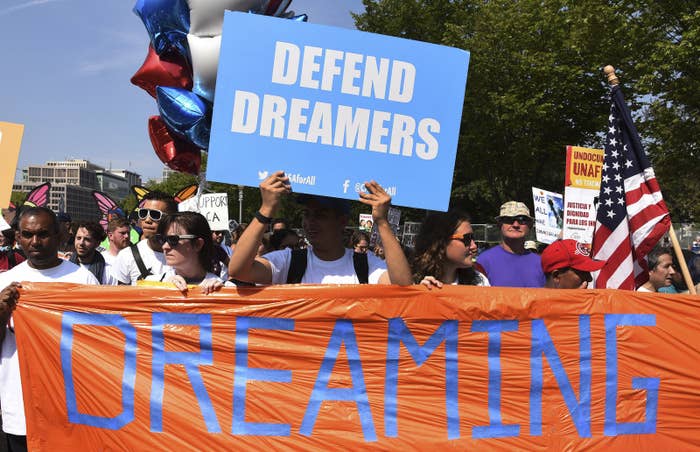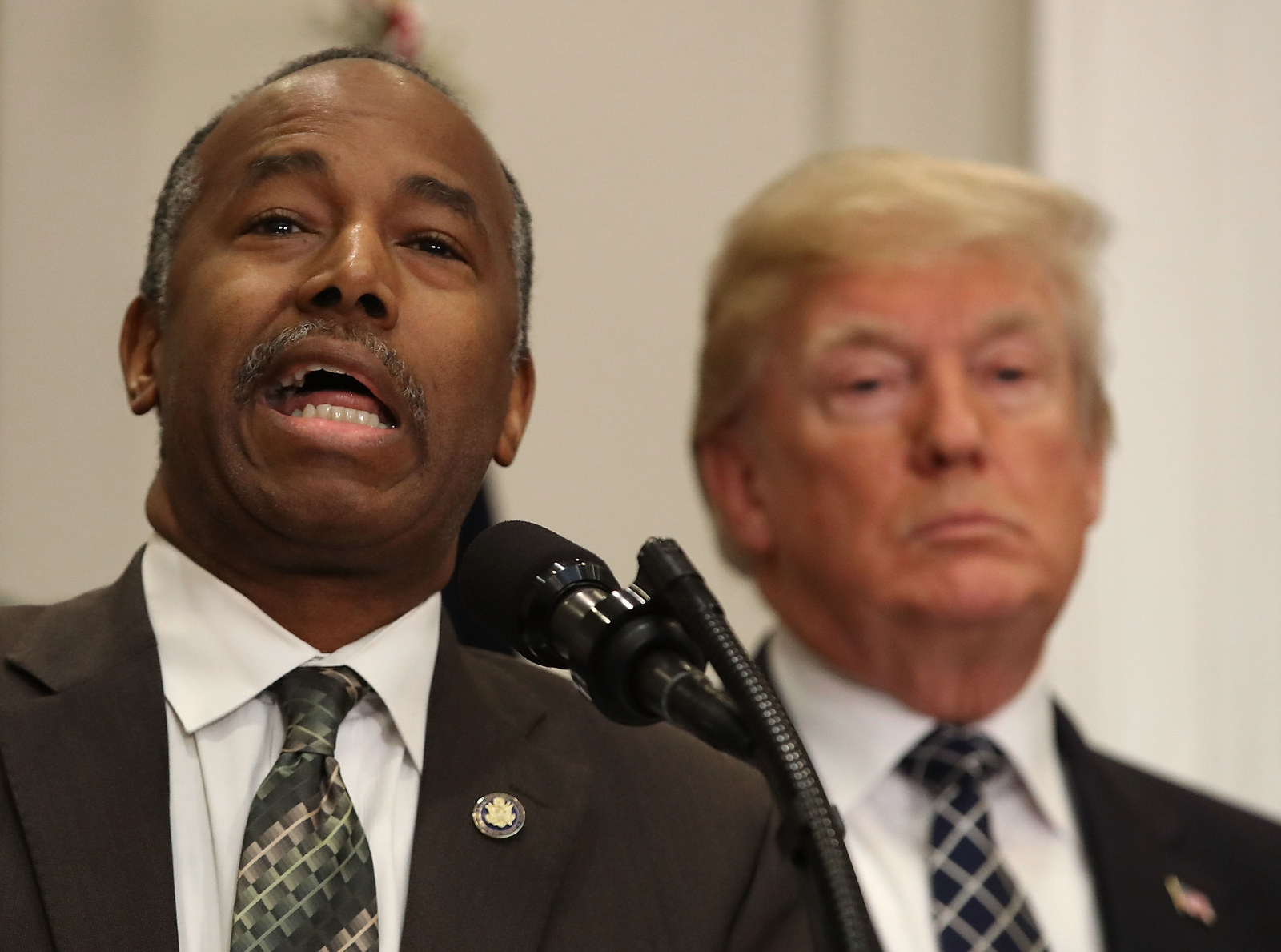
WASHINGTON — The Trump administration is refusing federal housing loans to young immigrants who were brought to the US illegally as children, despite Housing Secretary Ben Carson’s denials that it is happening.
BuzzFeed News first reported in December that the Department of Housing and Urban Development was quietly advising lenders to deny DACA recipients the government-insured loans, based on interviews with people who lost out on the loans because of their immigration status, as well as loan officers, realtors, and industry associations. When asked about that reporting, Carson told a congressional committee last month that he had no idea why they were being turned down for the loans and that he was “sure we have plenty of DACA recipients who have FHA-backed loans.”
But lenders are still getting advice in emails and verbal conversations with Carson’s staff at HUD that DACA recipients are not eligible for loans insured by the Federal Housing Administration (a part of HUD), according to interviews with lenders and documents reviewed by BuzzFeed News.
One lender, Geoff Huetten, reached out to the department help desk for clarification about whether he could issue FHA-backed loans to his clients who are DACA recipients. After several back-and-forths, Huetten finally received a direct answer March 20 in an email reviewed by BuzzFeed News.
“I said something to the effect of: 'I need a straightforward yes or no answer; does FHA lend to DACA borrowers? Is that acceptable?' And they came back and said no,” said Huetten, branch manager at Northwest Mortgage in Washington state.
“Per USCIS, individuals in the United States under the Deferred Action Childhood Arrival (DACA) program, EAD Category Code C33, are not considered to have lawful status,” the email from the FHA Resource Center said. “Therefore, the borrower(s) are not eligible for an FHA-insured mortgage.”
The answer was in line with the information that lenders and realtors say they’ve been getting for about a year from FHA help desks and HUD officials at conferences since roughly September 2017, when the Trump administration first moved to try to end the DACA program.
“I wasn’t happy to get the email in that I wanted it to be a yes, but I was happy to get it in that it was a straightforward, definitive answer,” said Heutten. “Here’s what they’re saying, so now we have evidence that HUD is actually denying these people for loans. Somebody at some level has put it out there and said, ‘No, we will not do these,’ because it’s not just me getting a no on this, it’s everybody.”
“The government is okay taking their taxes, but they draw the line at homeownership?”
Heutten said he wanted to share the answer he got because from his perspective, these young immigrants don’t deserve to be cut out of getting home loans.
“These are good borrowers, many of them are self-employed borrowers, they’ve created their own businesses, they’re paying their taxes,” Heutten said. “So … the government is okay taking their taxes, but they draw the line at homeownership? Good enough to take your taxes and your money but you can’t buy a home.”
HUD did not respond to a request for comment.
Less than two weeks after the department sent its email to Huetten, Carson testified before Congress that he had “asked around” after reading BuzzFeed News’s December story and that “no one was aware of any changes that had been made to the policy whatsoever.” adding that it would “surprise” him if DACA recipients were being turned down.
The FHA does not have any explicit policy about DACA recipients to begin with, though department officials are giving out advice to the contrary — DACA status is not directly addressed in the FHA’s single-family housing handbook, the set of rules the agency refers lenders to. The handbook says only that an Employment Authorization Document — which DACA recipients have — is necessary “to substantiate work status” for noncitizens and qualify for the housing loans.
Before the hearing, HUD responded to a letter asking about the issue from Democratic Rep. Pete Aguilar of California, saying that the department’s policy had not changed. Aguilar told BuzzFeed News that in a private meeting with Carson in February, the secretary assured him that “he had heard about the situation, that he had looked into it, and that it wasn’t happening.”
After Aguilar heard from more lenders that they were still being told to turn down DACA recipients, the Democrat sent a follow-up letter to Carson last week demanding answers about why the secretary did not provide accurate information during his hearing and in letters.
“Either he doesn’t know this is happening in the department he’s leading or he knows and he is not being truthful about it.”
Aguilar said he’s “frustrated and disappointed” that the secretary’s public testimony and comments to him in private conversations, including the February meeting, contradict what HUD officials are telling lenders.
“I want to be clear, I’ve spoken to him multiple times and each time he seems really understanding and assures me that DACA recipients are not being discriminated against,” Aguilar said. “That’s what is frustrating — either he doesn’t know this is happening in the department he’s leading or he knows and he is not being truthful about it.”
Aguilar also had a call scheduled for Tuesday with Carson, but told BuzzFeed News that “once HUD staff saw the letter and the questions [he] was asking the call was canceled.”
“His agency is funded through the subcommittee that I serve on and I’ll continue to let my colleagues know about the lack of progress on this issue,” Aguilar said. “If there are opportunities to clarify within that funding bill what might be an honest mistake, I’m happy to do that. I want to solve this issue.”
While top department officials including Carson and FHA Commissioner Brian Montgomery continue to avoid explaining why lenders are being told in emails, on the FHA’s hotline for lender questions, and at conferences not to issue the loans, some lenders say the situation is creating a sort of chilling effect, where many lenders are reluctant to try to get the loans for DACA recipients. Even some commercial lenders are becoming more reluctant to issue private loans to DACA recipients trying to buy a home, they said.
One loan officer in South Carolina, Yusuf Khan, says he has stopped trying to get government-backed loans for his DACA clients altogether, instead directing them to low-interest conventional loans. But that can still be a barrier for some young homebuyers, because the credit score and deposit requirements can be higher than the FHA-backed loans, which are designed to make homeownership more accessible. Khan said he so far hasn’t had any problems getting private loans for his DACA clients.

“I brought it up with my underwriters and they said, ‘From what we understand the FHA is not going to approve this.’ So I would say, ‘Hey, listen, we’re just going to do a conventional [loan] for you.’ It’s not worth putting someone through that,” Khan said, adding that people stand to lose money if their requests are denied late in the process, as several DACA recipients told BuzzFeed News previously.
A significant exception to the trend of lenders being reluctant to work with DACA recipients is Fannie Mae, the government-sponsored mortgage association, which released a policy in March this year reiterating that it will continue to provide DACA recipients with conventional home loans.
“We’re not changing our existing policies, but providing additional guidance to help lenders determine eligibility for non-U.S. citizen borrowers,” the policy says. A spokesperson for Fannie Mae added that the company "has a longstanding policy on eligibility for non-U.S. citizen borrowers."
Heutten says that could encourage some lenders to get back on board to issue FHA loans for DACA recipients — but it’s not enough without direct guidance from HUD.
“A few investors have put their foot back in the water a bit but not everybody, nobody’s quite sure,” he said. “If you don’t have answers to these questions it could end up costing you a lot of money.”
Danielle Hernandez, an underwriter who wrote a blog post last September about the discrepancy between the FHA handbook and what lenders are being told over email and at conferences, said Fannie Mae’s position is especially important because it’s a government-sponsored institution that lenders look to for guidance, even though it doesn’t issue FHA-backed loans itself.
“Fannie Mae’s non-US citizen requirements and FHA’s are pretty much the same,” said Hernandez. “With Fannie Mae coming out and saying DACA borrowers meet our requirements, and with FHA saying their policy hasn’t changed … it gives more credence to the fact that DACA borrowers do meet those requirements.”
Housing Wire reported in March that at least a dozen lenders including banks and state housing finance agencies have published explicit guidelines in the past year saying that DACA recipients are not eligible for FHA-backed loans.
“Most lenders are still not accepting FHA loans because they’re still hearing at conferences from HUD officials that HUD is telling them not to do this,” said Hernandez. “There’s still a bunch of confusion about it.” ●
CORRECTION
Khan, a loan officer, told BuzzFeed News he is advising DACA clients to apply for conventional loans rather than government-backed loans. An earlier version of this story incorrectly said he was advising that they apply for commercial loans.

